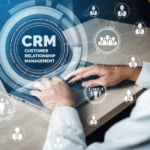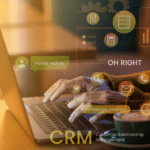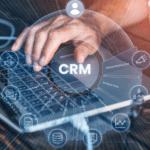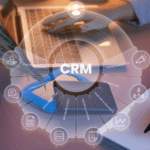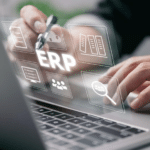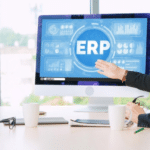Introduction to Cloud CRM Software
In today’s fast-paced business environment, managing customer relationships effectively is crucial for success. This is where Customer Relationship Management (CRM) software comes into play. Cloud-based CRM solutions have become increasingly popular due to their flexibility, accessibility, and cost-effectiveness. But with so many options available, how do you choose the right one for your business?
Key Considerations for Choosing Cloud CRM Software
When selecting a Cloud CRM solution, several factors should guide your decision-making process.
- Business Requirements
Understanding your specific business needs is the first step in choosing the right CRM software. - User-Friendliness
A user-friendly interface ensures that your team can easily adopt and effectively use the CRM system. - Customization Options
The ability to customize the CRM to fit your business processes is crucial for maximizing its effectiveness. - Integration Capabilities
Your CRM should seamlessly integrate with existing systems and tools to provide a unified view of customer data.
Assessing Business Requirements
Before diving into CRM options, it’s essential to assess your business requirements.
- Identifying Core Needs
Identify the core functionalities you need from a CRM, such as contact management, sales tracking, and customer service. - Scalability and Growth
Choose a CRM that can scale with your business as it grows, ensuring long-term usability. - Industry-Specific Features
Some CRMs offer industry-specific features that can be particularly beneficial depending on your sector.
Evaluating User-Friendliness
A user-friendly CRM system is key to ensuring high adoption rates among your team.
- Interface and User Experience
Look for a CRM with an intuitive interface and positive user experience feedback. - Training and Support
Consider the training and support options available to help your team get up to speed with the new system. - Mobile Accessibility
Ensure the CRM offers robust mobile accessibility for your team to manage customer relationships on the go.
Exploring Customization Options
Customization is essential for tailoring the CRM to your unique business needs.
- Tailoring to Business Processes
The CRM should allow you to customize workflows, fields, and modules to align with your business processes. - Flexibility and Adaptability
Choose a CRM that can adapt to changing business requirements without needing extensive reconfiguration. - Future-Proofing
Ensure the CRM can accommodate future business needs and technological advancements.
Integration Capabilities
Your CRM should integrate seamlessly with other tools and systems you use.
- Compatibility with Existing Systems
Check if the CRM is compatible with your existing software solutions, such as email, accounting, and marketing tools. - Data Migration and Synchronization
Ensure the CRM supports smooth data migration and synchronization to avoid data silos. - API Availability
APIs (Application Programming Interfaces) are crucial for integrating the CRM with other software solutions.
Cost and Budget Considerations
Understanding the costs associated with CRM software is vital for budgeting.
- Initial Investment vs. Ongoing Costs
Consider both the initial setup costs and ongoing subscription fees. - Subscription Models
CRMs typically operate on subscription models; choose one that fits your budget and offers the features you need. - Hidden Fees
Be aware of potential hidden fees, such as additional charges for extra features, users, or storage.
Security and Data Privacy
Security and data privacy are paramount when choosing a CRM solution.
- Data Encryption and Protection
Ensure the CRM provider uses robust data encryption and protection measures. - Compliance with Regulations
The CRM should comply with relevant data protection regulations, such as GDPR or HIPAA, depending on your industry. - Vendor Security Practices
Research the vendor’s security practices and protocols to ensure they align with industry standards.
Vendor Reputation and Reliability
Choose a CRM provider with a solid reputation and reliable service.
- Researching Vendors
Conduct thorough research on potential CRM vendors, including their history and client base. - Customer Reviews and Testimonials
Read customer reviews and testimonials to gauge the CRM’s performance and reliability. - Support and Service Level Agreements (SLAs)
Check the support options and SLAs to ensure you receive timely assistance when needed.
Performance and Reliability
A reliable CRM ensures continuous access to your customer data.
- Uptime Guarantees
Look for a CRM provider that offers uptime guarantees to minimize downtime. - Speed and Performance Metrics
Evaluate the CRM’s speed and performance to ensure it can handle your business’s demands. - Disaster Recovery Plans
Ensure the provider has robust disaster recovery plans to protect your data in case of an emergency.
Mobile and Remote Access
Mobile and remote access are essential features for modern businesses.
- Mobile CRM Capabilities
Ensure the CRM offers comprehensive mobile capabilities for managing customer relationships on the go. - Remote Access and Cloud Benefits
Cloud-based CRMs provide the flexibility of remote access, essential for distributed teams. - Offline Access Options
Check if the CRM offers offline access options for times when internet connectivity is unavailable.
Analytical and Reporting Features
Robust analytical and reporting features help you gain insights from your data.
- Built-In Analytics
Look for CRMs with built-in analytics tools for tracking performance and identifying trends. - Custom Report Generation
The ability to generate custom reports is crucial for meeting specific business needs. - Real-Time Data Insights
Real-time data insights enable you to make informed decisions quickly.
Training and Onboarding
Effective training and onboarding are key to a successful CRM implementation.
- Vendor-Supported Training Programs
Choose a CRM provider that offers comprehensive training programs to help your team get started. - Ease of Onboarding
The CRM should be easy to onboard, minimizing disruption to your business operations. - Continuous Learning Resources
Access to continuous learning resources, such as webinars and documentation, helps your team stay updated.
Customer Support and Service
Reliable customer support ensures you can resolve issues promptly.
- Types of Support Available
Check the types of support available, such as phone, email, and live chat. - Response Times
Evaluate the vendor’s response times to ensure you receive timely assistance. - Knowledge Base and Community Forums
Access to a knowledge base and community forums can provide additional support resources.
Future Trends in Cloud CRM Software
Staying aware of future trends can help you choose a CRM that remains relevant.
- AI and Machine Learning Integration
AI and machine learning are becoming increasingly important in CRM software, offering advanced customer insights and automation capabilities. - Advanced Customer Insights
Future CRMs will offer more advanced customer insights, helping businesses better understand and engage with their customers. - Enhanced User Experience
Expect continued improvements in user experience, making CRMs more intuitive and easier to use.
Conclusion
Choosing the right Cloud CRM Software involves careful consideration of your business needs, budget, security requirements, and future growth. By assessing these factors, you can select a CRM solution that enhances your customer relationship management and supports your business’s success.
FAQs
- What is Cloud CRM Software?
Cloud CRM Software is a customer relationship management system hosted on the cloud, allowing businesses to manage customer interactions and data remotely. - Why is Cloud CRM important for businesses?
Cloud CRM is important because it provides flexibility, accessibility, and scalability, enabling businesses to manage customer relationships more effectively. - How do I choose the right Cloud CRM for my business?
Consider your business requirements, budget, user-friendliness, customization options, integration capabilities, security, and vendor reputation when choosing a Cloud CRM. - What are the costs associated with Cloud CRM Software?
Costs can include initial setup fees, ongoing subscription costs, customization, and potential hidden fees. - How secure is Cloud CRM Software?
Security varies by provider, but reputable vendors offer robust data encryption, compliance with regulations, and strong security practices.

